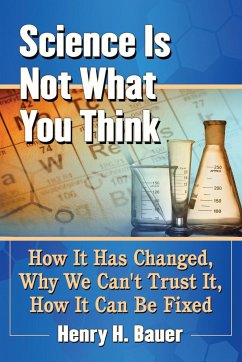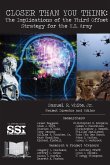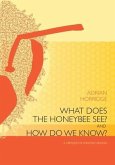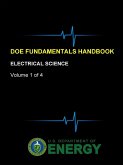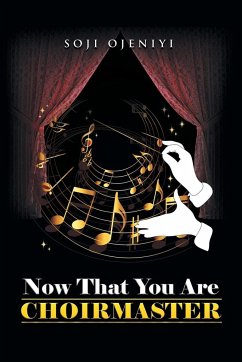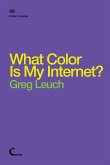Henry H. Bauer
Science Is Not What You Think
How It Has Changed, Why We Can't Trust It, How It Can Be Fixed
Henry H. Bauer
Science Is Not What You Think
How It Has Changed, Why We Can't Trust It, How It Can Be Fixed
- Broschiertes Buch
- Merkliste
- Auf die Merkliste
- Bewerten Bewerten
- Teilen
- Produkt teilen
- Produkterinnerung
- Produkterinnerung
This book discusses the ways in which science, the touchstone of reliable knowledge in modern society, changed dramatically in the second half of the 20th century, becoming less trustworthy through conflicts of interest and excessive competitiveness. Fraud became common enough that organized efforts to combat it now include a federal Office of Research Integrity. Competent minority opinions are sometimes thereby suppressed, with the result that policy makers, the media and the public are presented with biased or incomplete information. Evidence tending to challenge established theories is…mehr
Andere Kunden interessierten sich auch für
![Closer Than You Think Closer Than You Think]() Jr. Samuel R. WhiteCloser Than You Think25,99 €
Jr. Samuel R. WhiteCloser Than You Think25,99 €![Think Like an Author, Act Like a Fan Think Like an Author, Act Like a Fan]() Debra OwsleyThink Like an Author, Act Like a Fan24,99 €
Debra OwsleyThink Like an Author, Act Like a Fan24,99 €![What does the Honeybee See? And how do we Know?: A critique of scientific reason What does the Honeybee See? And how do we Know?: A critique of scientific reason]() Adrian HorridgeWhat does the Honeybee See? And how do we Know?: A critique of scientific reason32,99 €
Adrian HorridgeWhat does the Honeybee See? And how do we Know?: A critique of scientific reason32,99 €![Everyman's Encyclopaedia Of Etiquette - What To Write, What To Do, What To Wear, What To Say - A Book Of Manners For Everyday Use - Vol. I Everyman's Encyclopaedia Of Etiquette - What To Write, What To Do, What To Wear, What To Say - A Book Of Manners For Everyday Use - Vol. I]() Emily HoltEveryman's Encyclopaedia Of Etiquette - What To Write, What To Do, What To Wear, What To Say - A Book Of Manners For Everyday Use - Vol. I33,99 €
Emily HoltEveryman's Encyclopaedia Of Etiquette - What To Write, What To Do, What To Wear, What To Say - A Book Of Manners For Everyday Use - Vol. I33,99 €![DOE Fundamentals Handbook - Electrical Science (Volume 1 of 4) DOE Fundamentals Handbook - Electrical Science (Volume 1 of 4)]() U. S. Department of EnergyDOE Fundamentals Handbook - Electrical Science (Volume 1 of 4)25,99 €
U. S. Department of EnergyDOE Fundamentals Handbook - Electrical Science (Volume 1 of 4)25,99 €![Now That You Are Choirmaster Now That You Are Choirmaster]() Soji OjeniyiNow That You Are Choirmaster17,99 €
Soji OjeniyiNow That You Are Choirmaster17,99 €![What Color Is My Internet? What Color Is My Internet?]() Greg LeuchWhat Color Is My Internet?63,99 €
Greg LeuchWhat Color Is My Internet?63,99 €-
-
-
This book discusses the ways in which science, the touchstone of reliable knowledge in modern society, changed dramatically in the second half of the 20th century, becoming less trustworthy through conflicts of interest and excessive competitiveness. Fraud became common enough that organized efforts to combat it now include a federal Office of Research Integrity. Competent minority opinions are sometimes thereby suppressed, with the result that policy makers, the media and the public are presented with biased or incomplete information. Evidence tending to challenge established theories is sometimes rejected without addressing its substance. While most would agree in the abstract that science can go wrong, few would consider--despite interesting contrary evidence--that official consensus about the origins of the universe or the causes of global warming might be mistaken.
Hinweis: Dieser Artikel kann nur an eine deutsche Lieferadresse ausgeliefert werden.
Hinweis: Dieser Artikel kann nur an eine deutsche Lieferadresse ausgeliefert werden.
Produktdetails
- Produktdetails
- Verlag: McFarland
- Seitenzahl: 260
- Erscheinungstermin: 26. Juni 2017
- Englisch
- Abmessung: 229mm x 152mm x 15mm
- Gewicht: 427g
- ISBN-13: 9781476669106
- ISBN-10: 1476669104
- Artikelnr.: 47362228
- Herstellerkennzeichnung
- Libri GmbH
- Europaallee 1
- 36244 Bad Hersfeld
- gpsr@libri.de
- Verlag: McFarland
- Seitenzahl: 260
- Erscheinungstermin: 26. Juni 2017
- Englisch
- Abmessung: 229mm x 152mm x 15mm
- Gewicht: 427g
- ISBN-13: 9781476669106
- ISBN-10: 1476669104
- Artikelnr.: 47362228
- Herstellerkennzeichnung
- Libri GmbH
- Europaallee 1
- 36244 Bad Hersfeld
- gpsr@libri.de
Henry H. Bauer is professor emeritus of chemistry and science studies and dean emeritus of arts and sciences at Virginia Polytechnic Institute & State University (Virginia Tech). The author of numerous books, including several that examine scientific heterodoxies, he lives in Blacksburg, Virginia.
Table of Contents List of Figures viii Preface Introduction and Synopsis 1.
How Science Has Changed delete delete
Precursors of Modern Science delete delete
Three Eras of Modern Science delete delete
Science Today Is No Less Fallible Than in the Past delete delete
Science and Contemporary Society 2.
Science Is Not Methodical delete delete
The Scientific Method Explains Little About Today's Science delete delete
Why Has Science Been Successful? 3.
Some Other Misconceptions About Science delete delete
Science and Evidence: A Love-Hate Relationship delete delete
Replication and Reproducibility delete delete
Falsifiability of Scientific Theories delete delete
Scientific Literacy 4.
Science Is Many Things delete delete
Science Includes Which Subjects or Fields? delete delete
Science as Truth and Authority delete delete
Our Thinking Is Molded by Scientific Concepts delete delete
Scientific Institutions delete delete
Science Groupies and Hangers-on delete delete
Mimicking the Natural Sciences-Inappropriately 5.
Scientists Have Many Faces delete delete
Scientists as Individuals delete delete
The Cultures of Science delete delete
Present-Day Careers in Science
6.
How Science Really Gets Done delete delete
From Frontier Science to Textbook Science delete delete
Three Aspects of Scientific Activity delete delete
Diversity of Science delete delete
Peer Review delete delete
Resistance to Progress delete delete
Premature Discoveries delete delete
Scientific Revolutions delete delete
The Importance of Luck in Science delete delete
How Science Gets Done Best
7.
What Exactly Is "Scientific Knowledge"? delete delete
Facts and Theories: Maps and Stories delete delete
Over-Reliance on Science
8.
Statistics delete delete
Being Misled by Statistics delete delete
Correlation Is Not Causation delete delete
Interpreting Correlations delete delete
Aggregation and Dis-Aggregation delete delete
Statistical Significance and P Values delete delete
Effect Size delete delete
Margin of Error delete delete
Sampling delete delete
Differing Conceptual Approaches in Statistics delete delete
Summary: What Everyone Should Know About Statistics
9.
Unlike Physics and Chemistry? delete delete
Social and Behavioral Sciences delete delete
Medical Science delete delete
A Little Learning Can Be a Dangerous Thing delete delete
Fringe Science, Alternative Science, Pseudo-Science delete delete
Minority Views Within Mainstream Science delete delete
Knowledge to Guide Research-or Ready to Be Applied? delete delete
Science and Technology 10.
How Scientific Knowledge Becomes Known delete delete
From Science to Public Knowledge delete delete
Who Can Speak for Science? delete delete
What the Public Gets to Know: Let the Buyer Beware delete delete
What Policy Makers Get to Know delete delete
What Scientists Know and Get to Know 11.
Science Needs Tough Love delete delete
Reprise: The Predominant Scientific Consensus Is Not Always Right delete delete
Which of Today's Scientific Consensuses Might Be Wrong? delete delete
Where to Turn for the Soundest Judgment delete delete delete
on Technical Issues? delete delete
The Failure to Engage 12.
A Science Court? delete delete
Caveats and Complications delete delete
What a Science Court Could Accomplish delete delete
Tough Love Chapter Notes Bibliography Index
How Science Has Changed delete delete
Precursors of Modern Science delete delete
Three Eras of Modern Science delete delete
Science Today Is No Less Fallible Than in the Past delete delete
Science and Contemporary Society 2.
Science Is Not Methodical delete delete
The Scientific Method Explains Little About Today's Science delete delete
Why Has Science Been Successful? 3.
Some Other Misconceptions About Science delete delete
Science and Evidence: A Love-Hate Relationship delete delete
Replication and Reproducibility delete delete
Falsifiability of Scientific Theories delete delete
Scientific Literacy 4.
Science Is Many Things delete delete
Science Includes Which Subjects or Fields? delete delete
Science as Truth and Authority delete delete
Our Thinking Is Molded by Scientific Concepts delete delete
Scientific Institutions delete delete
Science Groupies and Hangers-on delete delete
Mimicking the Natural Sciences-Inappropriately 5.
Scientists Have Many Faces delete delete
Scientists as Individuals delete delete
The Cultures of Science delete delete
Present-Day Careers in Science
6.
How Science Really Gets Done delete delete
From Frontier Science to Textbook Science delete delete
Three Aspects of Scientific Activity delete delete
Diversity of Science delete delete
Peer Review delete delete
Resistance to Progress delete delete
Premature Discoveries delete delete
Scientific Revolutions delete delete
The Importance of Luck in Science delete delete
How Science Gets Done Best
7.
What Exactly Is "Scientific Knowledge"? delete delete
Facts and Theories: Maps and Stories delete delete
Over-Reliance on Science
8.
Statistics delete delete
Being Misled by Statistics delete delete
Correlation Is Not Causation delete delete
Interpreting Correlations delete delete
Aggregation and Dis-Aggregation delete delete
Statistical Significance and P Values delete delete
Effect Size delete delete
Margin of Error delete delete
Sampling delete delete
Differing Conceptual Approaches in Statistics delete delete
Summary: What Everyone Should Know About Statistics
9.
Unlike Physics and Chemistry? delete delete
Social and Behavioral Sciences delete delete
Medical Science delete delete
A Little Learning Can Be a Dangerous Thing delete delete
Fringe Science, Alternative Science, Pseudo-Science delete delete
Minority Views Within Mainstream Science delete delete
Knowledge to Guide Research-or Ready to Be Applied? delete delete
Science and Technology 10.
How Scientific Knowledge Becomes Known delete delete
From Science to Public Knowledge delete delete
Who Can Speak for Science? delete delete
What the Public Gets to Know: Let the Buyer Beware delete delete
What Policy Makers Get to Know delete delete
What Scientists Know and Get to Know 11.
Science Needs Tough Love delete delete
Reprise: The Predominant Scientific Consensus Is Not Always Right delete delete
Which of Today's Scientific Consensuses Might Be Wrong? delete delete
Where to Turn for the Soundest Judgment delete delete delete
on Technical Issues? delete delete
The Failure to Engage 12.
A Science Court? delete delete
Caveats and Complications delete delete
What a Science Court Could Accomplish delete delete
Tough Love Chapter Notes Bibliography Index
Table of Contents List of Figures viii Preface Introduction and Synopsis 1.
How Science Has Changed delete delete
Precursors of Modern Science delete delete
Three Eras of Modern Science delete delete
Science Today Is No Less Fallible Than in the Past delete delete
Science and Contemporary Society 2.
Science Is Not Methodical delete delete
The Scientific Method Explains Little About Today's Science delete delete
Why Has Science Been Successful? 3.
Some Other Misconceptions About Science delete delete
Science and Evidence: A Love-Hate Relationship delete delete
Replication and Reproducibility delete delete
Falsifiability of Scientific Theories delete delete
Scientific Literacy 4.
Science Is Many Things delete delete
Science Includes Which Subjects or Fields? delete delete
Science as Truth and Authority delete delete
Our Thinking Is Molded by Scientific Concepts delete delete
Scientific Institutions delete delete
Science Groupies and Hangers-on delete delete
Mimicking the Natural Sciences-Inappropriately 5.
Scientists Have Many Faces delete delete
Scientists as Individuals delete delete
The Cultures of Science delete delete
Present-Day Careers in Science
6.
How Science Really Gets Done delete delete
From Frontier Science to Textbook Science delete delete
Three Aspects of Scientific Activity delete delete
Diversity of Science delete delete
Peer Review delete delete
Resistance to Progress delete delete
Premature Discoveries delete delete
Scientific Revolutions delete delete
The Importance of Luck in Science delete delete
How Science Gets Done Best
7.
What Exactly Is "Scientific Knowledge"? delete delete
Facts and Theories: Maps and Stories delete delete
Over-Reliance on Science
8.
Statistics delete delete
Being Misled by Statistics delete delete
Correlation Is Not Causation delete delete
Interpreting Correlations delete delete
Aggregation and Dis-Aggregation delete delete
Statistical Significance and P Values delete delete
Effect Size delete delete
Margin of Error delete delete
Sampling delete delete
Differing Conceptual Approaches in Statistics delete delete
Summary: What Everyone Should Know About Statistics
9.
Unlike Physics and Chemistry? delete delete
Social and Behavioral Sciences delete delete
Medical Science delete delete
A Little Learning Can Be a Dangerous Thing delete delete
Fringe Science, Alternative Science, Pseudo-Science delete delete
Minority Views Within Mainstream Science delete delete
Knowledge to Guide Research-or Ready to Be Applied? delete delete
Science and Technology 10.
How Scientific Knowledge Becomes Known delete delete
From Science to Public Knowledge delete delete
Who Can Speak for Science? delete delete
What the Public Gets to Know: Let the Buyer Beware delete delete
What Policy Makers Get to Know delete delete
What Scientists Know and Get to Know 11.
Science Needs Tough Love delete delete
Reprise: The Predominant Scientific Consensus Is Not Always Right delete delete
Which of Today's Scientific Consensuses Might Be Wrong? delete delete
Where to Turn for the Soundest Judgment delete delete delete
on Technical Issues? delete delete
The Failure to Engage 12.
A Science Court? delete delete
Caveats and Complications delete delete
What a Science Court Could Accomplish delete delete
Tough Love Chapter Notes Bibliography Index
How Science Has Changed delete delete
Precursors of Modern Science delete delete
Three Eras of Modern Science delete delete
Science Today Is No Less Fallible Than in the Past delete delete
Science and Contemporary Society 2.
Science Is Not Methodical delete delete
The Scientific Method Explains Little About Today's Science delete delete
Why Has Science Been Successful? 3.
Some Other Misconceptions About Science delete delete
Science and Evidence: A Love-Hate Relationship delete delete
Replication and Reproducibility delete delete
Falsifiability of Scientific Theories delete delete
Scientific Literacy 4.
Science Is Many Things delete delete
Science Includes Which Subjects or Fields? delete delete
Science as Truth and Authority delete delete
Our Thinking Is Molded by Scientific Concepts delete delete
Scientific Institutions delete delete
Science Groupies and Hangers-on delete delete
Mimicking the Natural Sciences-Inappropriately 5.
Scientists Have Many Faces delete delete
Scientists as Individuals delete delete
The Cultures of Science delete delete
Present-Day Careers in Science
6.
How Science Really Gets Done delete delete
From Frontier Science to Textbook Science delete delete
Three Aspects of Scientific Activity delete delete
Diversity of Science delete delete
Peer Review delete delete
Resistance to Progress delete delete
Premature Discoveries delete delete
Scientific Revolutions delete delete
The Importance of Luck in Science delete delete
How Science Gets Done Best
7.
What Exactly Is "Scientific Knowledge"? delete delete
Facts and Theories: Maps and Stories delete delete
Over-Reliance on Science
8.
Statistics delete delete
Being Misled by Statistics delete delete
Correlation Is Not Causation delete delete
Interpreting Correlations delete delete
Aggregation and Dis-Aggregation delete delete
Statistical Significance and P Values delete delete
Effect Size delete delete
Margin of Error delete delete
Sampling delete delete
Differing Conceptual Approaches in Statistics delete delete
Summary: What Everyone Should Know About Statistics
9.
Unlike Physics and Chemistry? delete delete
Social and Behavioral Sciences delete delete
Medical Science delete delete
A Little Learning Can Be a Dangerous Thing delete delete
Fringe Science, Alternative Science, Pseudo-Science delete delete
Minority Views Within Mainstream Science delete delete
Knowledge to Guide Research-or Ready to Be Applied? delete delete
Science and Technology 10.
How Scientific Knowledge Becomes Known delete delete
From Science to Public Knowledge delete delete
Who Can Speak for Science? delete delete
What the Public Gets to Know: Let the Buyer Beware delete delete
What Policy Makers Get to Know delete delete
What Scientists Know and Get to Know 11.
Science Needs Tough Love delete delete
Reprise: The Predominant Scientific Consensus Is Not Always Right delete delete
Which of Today's Scientific Consensuses Might Be Wrong? delete delete
Where to Turn for the Soundest Judgment delete delete delete
on Technical Issues? delete delete
The Failure to Engage 12.
A Science Court? delete delete
Caveats and Complications delete delete
What a Science Court Could Accomplish delete delete
Tough Love Chapter Notes Bibliography Index

